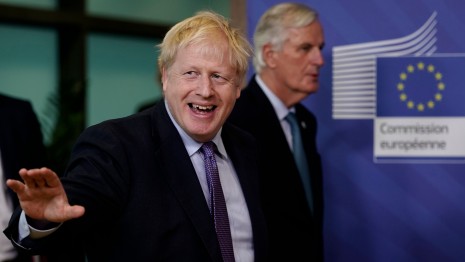Challenges aplenty as UK and EU ‘get Brexit started’
https://arab.news/bu5uu

This week’s first round of EU-UK negotiations on a new trade and wider partnership concludes on Thursday. With the final form of the UK’s departure from the EU still far from clear, this underlines how much is yet to be agreed, despite the London government’s claim that Brexit is already “done.”
Indeed, far from the UK’s exit having been concluded, this week is really about “getting Brexit started” in earnest. While the nation’s withdrawal from the EU on Jan. 31 may have been a seminal moment in post-war history, Brexit is far from being a single, isolated event. Instead it is a much broader process of negotiations (a catch-all term used here for formal diplomatic discussions and wider debates about Brexit) between the UK and EU, and within the UK, about their respective futures.
So even with a Brexit withdrawal deal now ratified, there are multiple scenarios still possible, from a disorderly exit this year through to the outside possibility of the transition being extended and a deep, comprehensive deal being concluded later in the 2020s.
Turning to this week, at the start of what could be the most complex peacetime dialogue ever undertaken by the parties, the mood music over a potential deal is darkening. While there is overlap between the starting positions of Brussels and London, the timeframes are very tight, with Boris Johnson asserting that the UK will walk away from trade talks in June unless there is a “broad outline” of a comprehensive deal capable of being “rapidly finalized” by September.
While at least an interim UK-EU deal may still be the most likely outcome this year, there is a growing chance of talks collapsing. To this end, the UK government said this week that it had recommenced preparations to end the transition period without a trade deal on World Trade Organization terms.
One of the reasons that the talks this year may not go as well as hoped is the current overstretch in the UK government on the trade negotiation side. The responsibility for this area of policy has long been transferred by EU states to Brussels, and London is therefore behind the curve on this issue and making up ground after almost five decades in the bloc.
Moreover, at the same time as UK policymakers are focused on an EU deal, they are also looking to agree trade deals with many non-European countries. Take the example of a potential agreement with the US, which has been the focus of much attention in London this week. The UK government declared this week, in a 180-page negotiating position for the talks, that a post-Brexit trade deal is a big priority. Yet London’s own analysis indicates that such an agreement would boost the nation’s economy by a puny 0.16 percent over the next 15 years. Inevitably, this has led to concerns being expressed that the benefits of a transatlantic deal have been much exaggerated. For instance, Liberal Democrat international trade spokesperson Sarah Olney said on Monday that a US-UK deal “will not come close to outweighing what we expect to lose from leaving the EU.”
Another key challenge for London with the potential new UK-US trade deal is that it may not now be possible to secure ratification before the end of Trump’s current four-year term, given that the administration is, in an election year, losing traction in Congress, which would also need to vote on a deal. This means that a new agreement will likely be kicked out to 2021, when there could be a new president.
Even if Trump is re-elected, there is a growing range of issues where he appears to be significantly at odds with Johnson, such as Huawei, a proposed UK digital tax, and climate change. Moreover, while there are key areas ripe for agreement between the two nations in such a US-UK pact, including lowering or eliminating tariffs on goods, there are potential disagreements too, not least given the current president’s rhetorical commitment to “America First.”
While at least an interim UK-EU deal may still be the most likely outcome this year, there is a growing chance of talks collapsing.
Andrew Hammond
What the challenges around the US deal underline is that, as keen as Johnson is to rediscover the UK’s heritage “as a great global trading nation” post-Brexit, this is not a straightforward agenda to realize in practice. This is not just with leading developed nations like the US, Australia, Canada and New Zealand, but also major emerging markets like China, India and the Gulf Cooperation Council states, given the range of issues in play.
This underlines the major trade challenges now facing London, not least on Brexit, given the complexity of the debate. The final form of the UK’s departure from the EU remains far from clear and there is still a very significant possibility of a disorderly exit, given Johnson’s current red line around the transition period ending in December.
The stakes in play therefore remain huge and historic, not just for the UK, but also the EU, which could be damaged by a disorderly Brexit. Delivering a smoother departure needs clear, coherent and careful thinking on all sides, so that London, Brussels and the EU-27 can move toward a constructive new partnership that can hopefully bring significant benefits for both at a time of great geopolitical flux.
- Andrew Hammond is an Associate at LSE IDEAS at the London School of Economics.









































